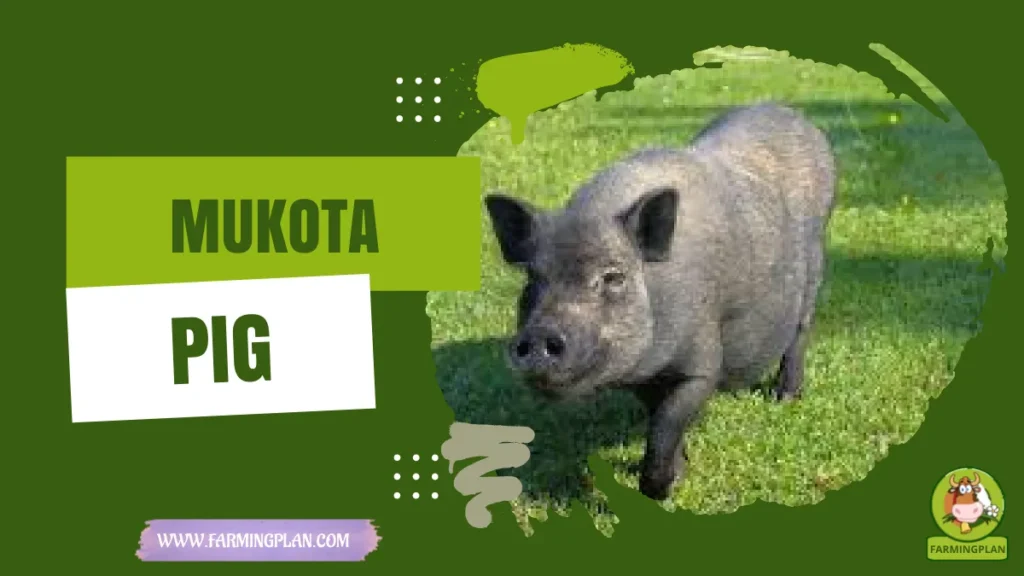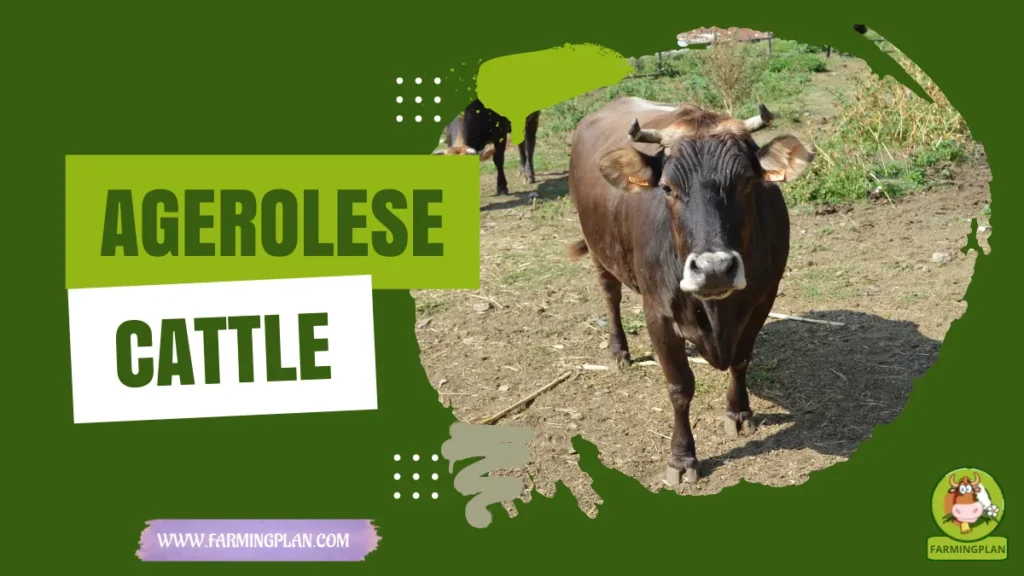If you want a manageable pet rabbit with a small size and friendly demeanor, you should consider the Florida White Rabbit. Meet the Florida White Rabbit. Pet rabbit owners, together with farmers and rabbit enthusiasts, embrace the all-white Florida White breed because it remains serene while offering excellent meat production. The white coat, together with a set of red eyes, makes this bunny recognized easily among rabbit breeds. It’s perfect for first-time owners thanks to its docile temperament and simple care needs. Whether you want a loving pet or a reliable breed for meat production, the Florida White Rabbit checks all the boxes.
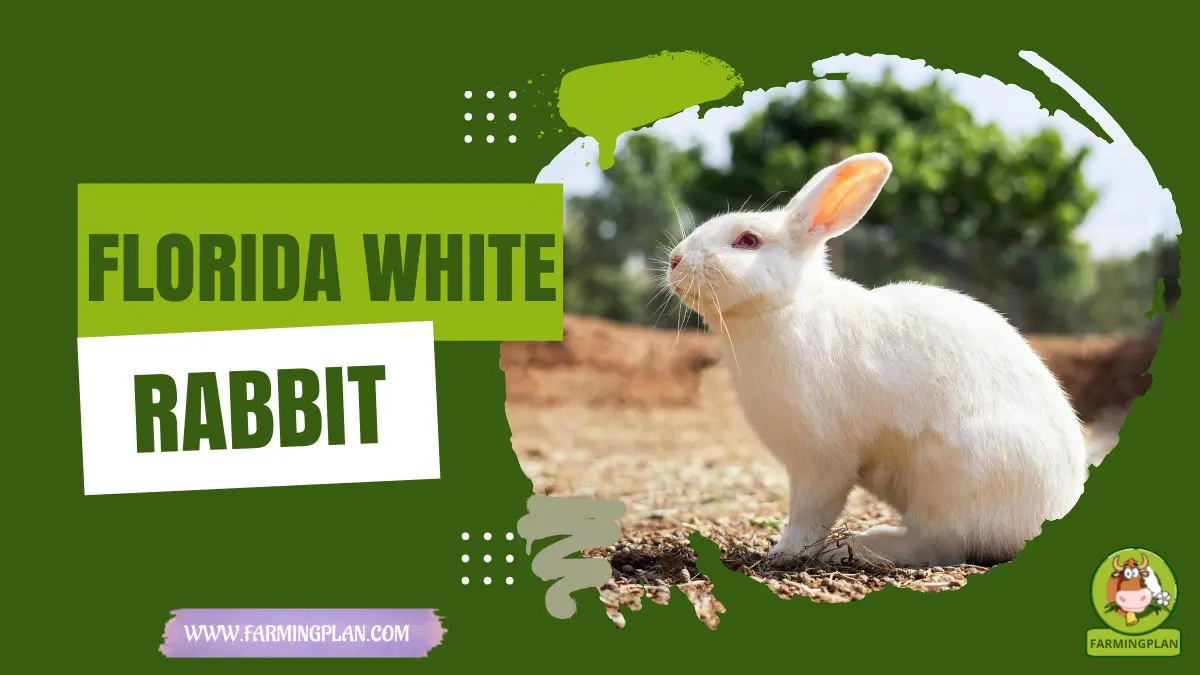
History & Origin
The Florida White Rabbit, a product of the 1960s, was the brainchild of a man named AR Pickens from Florida. His vision was to create a small, compact rabbit ideal for meat production and laboratory use. To achieve this, he crossed Albino Dutch, Polish, and New Zealand White rabbits, resulting in a pure white rabbit with pink eyes and a calm nature.
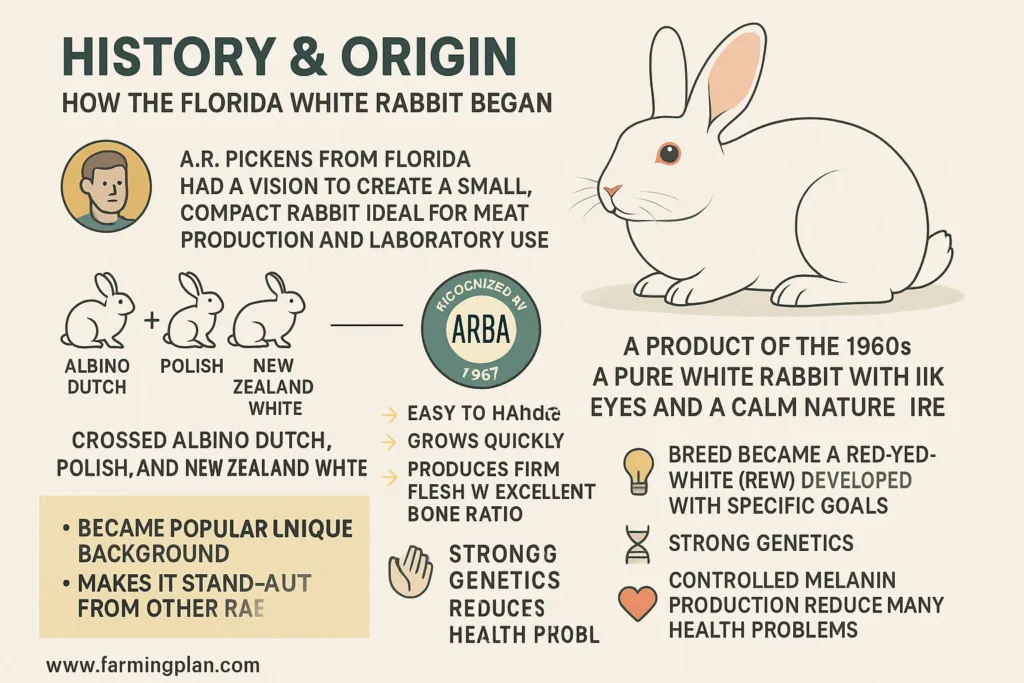
This breed was officially recognized by the American Rabbit Breeders Association (ARBA) in 1967. Since then, the Florida White Rabbit has become a favorite for those looking for a breed that is easy to handle, grows quickly, and produces firm flesh with an excellent bone ratio. It is also commonly used in labs due to its uniform size, health, and quiet behavior.
At the same time, it may look like a typical albino rabbit, but the Florida White is actually a red-eyed white (REW) rabbit, developed with specific goals in mind—not just its appearance. This breed’s unique background makes it stand out from other rabbit breeds. Its strong genetics and controlled melanin production help reduce many breed-specific health problems, making it a wise choice for both beginners and experts.
Reads More: Dutch Hookbill Duck: 7 Remarkable Reasons to Love This Rare Breed
Characteristics
The Florida White Rabbit displays strong health characteristics combined with a likable personality, even though it presents itself with basic simplicity. This breed combines features that make it ideal for commercial purposes and pet adoption because its body size and muscular makeup are perfect. Adult Florida Whites weigh 4 to 6 pounds, which makes them suitable pets for family homes and small farming settings. The distinctive trait of this rabbit breed includes its white fur combined with pinkish-red colored eyes, which develop because the rabbits cannot produce melanin.
The short, soft fur is easy to maintain and rarely mats. The body is balanced and firm, showing good bone structure without being bulky. These features make the Florida White a top choice for rabbit shows. Unlike larger rabbits, this breed fits comfortably in indoor rabbit setups or Rabbit Hutches. Its calm posture and strong body make it look both cute and confident. When compared to Rex Rabbits or other popular rabbit breeds, the Florida White stands out with its striking appearance and overall healthy build.
Nature & Temperament
The Florida White Rabbit is renowned for its docile temperament and calm personality. This makes it an excellent choice for first-time rabbit owners, families with children, or anyone seeking a gentle pet. These rabbits thrive in quiet environments and are not easily stressed, even with frequent handling.
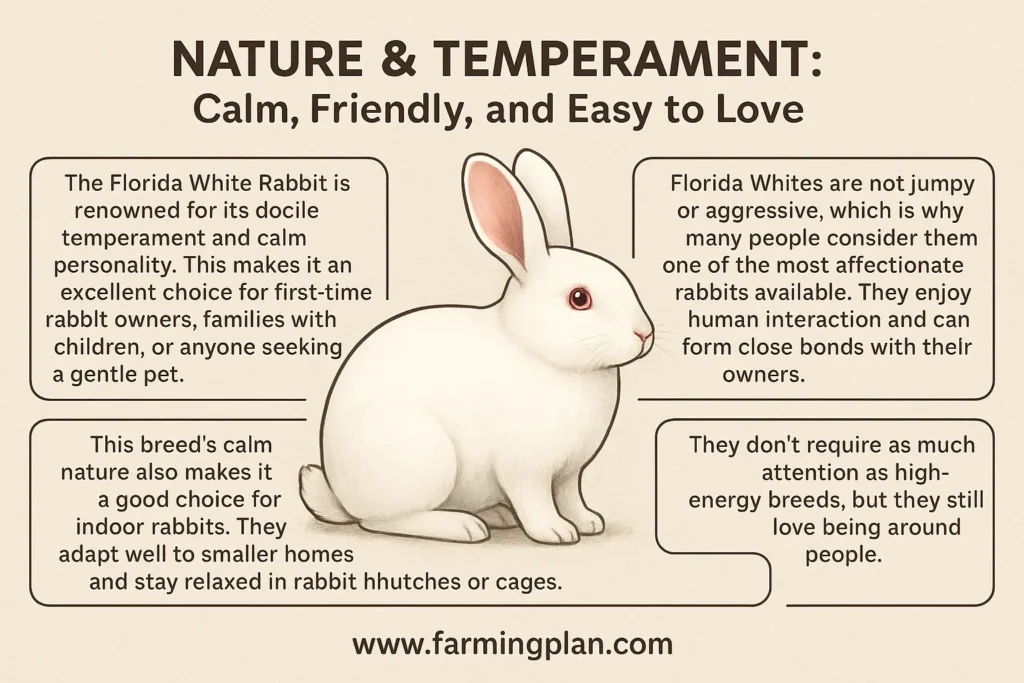
Florida whites are not jumpy or aggressive, which is why many people consider them one of the most affectionate rabbits available. They enjoy human interaction and can form close bonds with their owners, especially when given enough personal space and care. They don’t require as much attention as high-energy breeds, but they still love being around people. This breed’s calm nature also makes it a good choice for indoor rabbits. They adapt well to smaller homes and stay relaxed in Rabbit Hutches or cages as long as there’s plenty of room to stretch and rest. Even experienced breeders use Florida Whites for laboratory work and rabbit shows because of their easygoing behavior.
Food & Diet
Feeding your Florida White Rabbit the right food is key to keeping it happy and strong. A balanced diet helps support digestive health, coat health, and overall well-being. Start with fiber-rich rabbit pellets as the main food. These provide the nutrients your rabbit needs every day. Along with pellets, offer leafy greens like romaine lettuce, kale, and cilantro. These greens give your rabbit variety and help keep its digestion smooth. Make sure to avoid iceberg lettuce, as it has little nutrition. Always give your rabbit fresh water. Change the water daily, and keep the bowl or bottle clean. Hydration is essential for preventing common health concerns in rabbits.
Hay is also a must. Your rabbit should have plenty of hay every day, like Timothy or orchard grass. Hay helps wear down teeth and keeps their gut moving. Avoid sugary snacks, bread, and human food. These can cause stomach issues and raise the risk of rabbit hemorrhagic diseases or other health conditions. With the proper diet, your Florida White will stay active, have firm flesh, and live a long, healthy life.
Tip: “Stick to a diet high in fiber and low in sugar to keep your rabbit’s belly and teeth in great shape.”
Usage & Purpose
The Florida White Rabbit is a breed that truly offers versatility. Whether you’re a hobbyist, farmer, or pet lover, this rabbit has something to offer. Its firm flesh, high meat-to-bone ratio, and predictable size make it an ideal choice for laboratory use and commercial meat production. Its small frame and compact body also make it suitable for limited living spaces or cage setups.
Today, many people choose the Florida White Rabbit as a pet. Its calm temperament and simple care needs make it one of the best breeds for first-time rabbit owners. It’s also becoming more popular as a show rabbit due to its clean, white coat and balanced shape—qualities that judges look for. Breeders value this rabbit not only for its meat quality but also for its manageable size and strong genetics. It grows quickly, doesn’t require a lot of food, and thrives with basic care. So, whether you want a pet rabbit, a meat rabbit, or a reliable choice for rabbit breeding, the Florida White delivers.
Special Features
The Florida White Rabbit may look simple, but it has several features that make it special. First, its signature white coat and red eyes give it a striking appearance. While some people confuse it with other albino rabbits, this breed is a carefully developed red-eyed white (REW) rabbit with strong health and structure.
One standout feature is its firm flesh and excellent bone ratio, which makes it ideal for meat production. Unlike larger rabbits that may have more bone than meat, the Florida White gives you more usable meat per pound—something both farmers and breeders appreciate. Another unique trait is its calm, loving temperament. This makes it a top choice for families and indoor rabbit setups. It doesn’t require much space and fits well in small homes or apartments.
Florida White is also known for low maintenance. Its short fur doesn’t need much grooming, and its manageable size makes it easy to handle. These rabbits rarely suffer from hereditary health problems, which is a big plus for long-term care. Whether you’re showing, breeding, or keeping one as a pet, the Florida White’s beauty, behavior, and build set it apart from other rabbit breeds.
Health Issues & Prevention
The Florida White Rabbit is a strong and healthy breed, but like all rabbits, it can face some common health issues. Good care and early prevention can help your rabbit live a long and happy life. One concern to watch for is rabbit hemorrhagic disease (RHD). This is a severe virus that spreads quickly and can be deadly. Ask your vet about vaccines to keep your rabbit protected. Also, keep your rabbit’s area clean and free of insects.
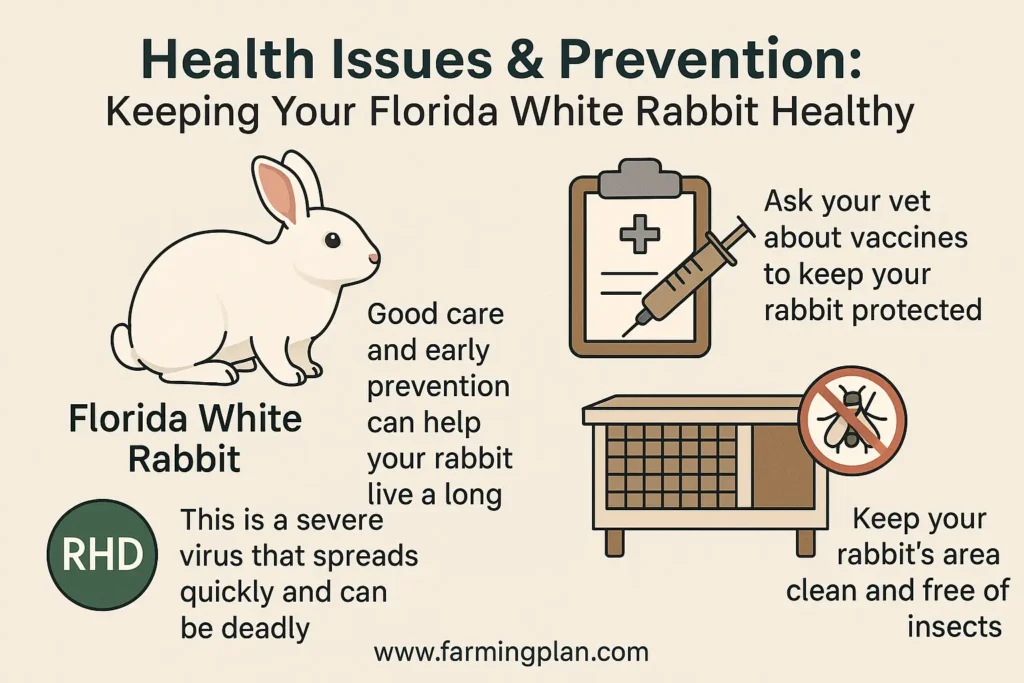
Digestive health is another critical area. These rabbits need a fiber-rich diet with plenty of hay. Avoid sugary snacks, as they can lead to bloating or GI stasis—a serious condition that slows digestion. Check your rabbit’s hocks (back feet) regularly. Florida Whites can get sore hocks if they stand on wire floors too much. Use soft mats or a Floor Cat Dog Birds Rabbit Chicken Cage Pad Feet Board to keep your feet safe.
Their red eyes can be sensitive to bright light. Place cages in areas with plenty of windows but not direct sun. Look out for signs of eye irritation or discharge. Regular grooming helps maintain coat health, even if their fur is short. Also, watch for common rabbit diseases like ear mites, overgrown teeth, and heat stress. With the proper care, most Florida White Rabbits stay active and disease-free. Always buy from a reputable breeder who shares your rabbit’s health history.
Reads More: Barbados Blackbelly Sheep: 7 Powerful Benefits for Farmers
Step-by-Step Farming Guide / Pet Owner Care Guide
Raising a Florida White Rabbit is a rewarding experience. Whether you’re growing it for meat production, as a pet, or for show, here’s a step-by-step guide to make sure your rabbit gets the best care:
Step 1: Set Up the Right Space
Ensure your rabbit has enough room to move. A Rabbit Hutch should be spacious, dry, and safe from predators. It should also have soft bedding material like hay or straw for comfort. If you’re keeping your rabbit indoors, provide a safe space like a pet playpen or a dedicated room where it can roam freely but safely.
Step 2: Feeding and Hydration
- Provide hay every day: Fresh Timothy hay is essential for your rabbit’s digestion and teeth health.
- Offer leafy greens: Romaine lettuce, parsley, and kale are good choices.
- Rabbit pellets: Use fiber-rich rabbit pellets to ensure your rabbit gets the proper nutrients.
- Always provide fresh water: Check daily to make sure the water is clean and available.
Step 3: Regular Cleaning
A clean living space is essential for preventing health issues. Clean the hutch weekly and change the bedding as needed. Wipe down Rabbit Cage Feeders and water bottles to prevent bacteria buildup.
Step 4: Exercise and Socialization
Florida White Rabbits are active and curious. Allow them at least 2–3 hours of exercise each day. You can let them roam in a safe, enclosed space or play with them. Interaction with family members helps keep them friendly and well-socialized.
Step 5: Health Checks
Regularly check your rabbit for signs of illness. Look out for:
- Changes in eating or drinking habits
- Lumps or bumps on the skin
- Eye discharge or crustiness
- Hock sores from rough surfaces
Visit the vet at least once a year for a health checkup and ensure your rabbit is up to date on vaccinations.
Step 6: Grooming
Florida White Rabbits have short fur, but grooming them regularly is still helpful. Brush them a few times a week to keep their coat shiny and free of debris. Also, pay attention to their nails and trim them if needed.
Expert Tips & Best Practices
Caring for a Florida White Rabbit is straightforward, but here are some expert tips to ensure your rabbit thrives in both health and happiness:
Create a Comfortable Home Environment
A comfortable home is key to a healthy rabbit. If you plan to keep your Florida White indoors, provide them with plenty of space to explore. They love hopping around, so having plenty of windows or an outdoor playpen can offer a natural, enriching environment. For outdoor rabbits, ensure that their hutch is protected from the elements and predators. Make sure it is ventilated but also warm during colder months. Adding soft bedding will keep them cozy during the night.
Offer Plenty of Fresh Greens
Leafy greens are a must for your rabbit’s diet but always offer them in moderation. Too many leafy greens like spinach or kale can cause digestive issues. Instead, try offering a variety of leafy greens and high-quality hay to keep their diet well-balanced and interesting.
Monitor Their Exercise
Florida Whites are active and enjoy hopping around. Let your rabbit exercise in a safe, enclosed space. This promotes healthy bone development, improves their digestive health, and keeps them mentally stimulated.
Health Prevention is Key
Prevent health problems before they start. Regularly check for common rabbit diseases, keep their environment clean, and get them vaccinated against rabbit hemorrhagic disease (RHD). Schedule annual vet visits for overall health checks, and don’t forget to watch out for teeth overgrowth or sore hocks.
Socialize Early and Often
Florida Whites are known for their calm temperament. But like all rabbits, they need to be socialized from a young age. Spend time with them daily, whether it’s petting them, letting them out to play, or simply allowing them to hop around the house. The more attention and socialization they get, the more affectionate they’ll become.
Expert Tip: “A well-socialized Florida White Rabbit makes a great pet for children and families, as they are affectionate and friendly.”
Know the Breeding Basics
If you plan on breeding your Florida White Rabbit, make sure you understand rabbit breeding basics. This includes monitoring their reproductive health and understanding their litter sizes. To avoid genetic health issues, make sure your breeding pair comes from a reputable breeder.
“A Florida White Rabbit Brings Joy, Comfort, And A Touch Of Nature To Any Home!”
Where to Buy: Finding Your Florida White Rabbit
If you’re ready to bring a Florida White Rabbit into your home, it’s essential to buy from a reputable breeder or seller who prioritizes health, temperament, and proper breeding standards. Here’s where you can find a Florida White Rabbit:
Reputable Rabbit Breeders
Look for breeders who specialize in Florida White Rabbits. These breeders should provide information about the rabbit’s health history and be able to show you the living conditions of their rabbits. Breeders affiliated with the American Rabbit Breeders Association (ARBA) or the Florida White Rabbit Breeders Association are typically a safe bet, as they follow industry standards for breeding and care.
You can find breeders through:
- Florida White Rabbit Breeders Association (FWRBA) Website
- ARBA membership directory (for certified breeders)
Pet Stores
Some pet stores may carry Florida White Rabbits, but it’s important to choose stores with a good reputation. Always ensure that the store provides proper care for its animals and that you can ask about the rabbit’s health history. A reputable pet store will also offer advice on rabbit care and should not pressure you into buying before you’re ready.
Animal Shelters or Rescue Groups
Adopting a shelter or rescue is another excellent option. Although Florida White Rabbits are more commonly bred for meat or show, occasionally, they show up in rescues looking for a new home. Look for local rabbit rescues or shelters that specialize in small animals, and check online adoption platforms like Petfinder.
Online Marketplaces
Websites like Craigslist or Facebook Marketplace can offer listings for Florida White Rabbits, but be cautious when purchasing from individuals. Always ask for health records and ensure the seller maintains ethical breeding practices. Do your research and avoid purchasing rabbits from places that seem unreliable or overcrowded.By choosing the right source, you can find a healthy, happy Florida white rabbit ready to join your family.
Tip: “Be sure to ask for the rabbit’s vaccination history and health records before purchasing to ensure you’re getting a healthy companion.”
FAQs
What is the origin of the Florida White Rabbit?
The Florida White Rabbit was developed in the 1960s by Judge Orville Miliken through crossbreeding albino Dutch, red-eyed-white Polish, and white New Zealand rabbits. It was recognized by the American Rabbit Breeders Association in 1967.
What is the ideal diet for a Florida White Rabbit?
A balanced diet for a Florida White Rabbit includes unlimited access to fresh hay, such as Timothy hay, supplemented with leafy greens like kale, parsley, and romaine lettuce. To prevent obesity, limit pellets to 1/8 to 1/4 cup per day.
How much space does a Florida White Rabbit need?
Florida White Rabbits require a spacious, well-ventilated enclosure. A minimum size of 24″ x 36″ is recommended, but larger is better. Ensure the cage has a solid floor to prevent sore hocks and provide soft bedding for comfort.
Are Florida White Rabbits good pets for children?
Yes, Florida White Rabbits are known for their calm and affectionate temperament, making them excellent companions for children. They are gentle, easy to handle, and enjoy human interaction.
What are common health issues in Florida White Rabbits?
Common health issues include dental problems like malocclusion, gastrointestinal stasis, and respiratory infections. Regular veterinary checkups, a proper diet, and a clean living environment are essential for prevention.
Conclusion
The Florida White Rabbit emerged from laboratory work and meat production needs to become one of the most popular pet rabbit breeds due to its docile temperament and compact size. The Florida White Rabbit needs a diet consisting of hay and leafy greens in addition to regular exercises and appropriate grooming to succeed in spacious, clean living areas. Families find them great companions due to their friendly disposition and their solid body, which offers advantages for small-scale meat production. Florida White Rabbit provides owners dual benefits because they serve well as house pets as well as breeding animals.

